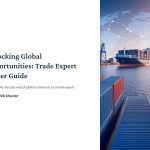
 In today’s hyper-connected world, international trade is more than just import and export—it’s the engine of global economic growth. With shifting supply chains, emerging digital platforms, and increasing cross-border collaborations, the demand for professionals with global business acumen and international experience is higher than ever. Those who act now can position themselves ahead of the curve, building careers that transcend borders and drive innovation in the global marketplace.
In today’s hyper-connected world, international trade is more than just import and export—it’s the engine of global economic growth. With shifting supply chains, emerging digital platforms, and increasing cross-border collaborations, the demand for professionals with global business acumen and international experience is higher than ever. Those who act now can position themselves ahead of the curve, building careers that transcend borders and drive innovation in the global marketplace.

Why International Trade Is a Smart Career Move
International trade opens doors to a vast array of opportunities across various industries. From logistics and supply chain management to international marketing and finance, trade professionals are essential for maintaining and expanding global commerce. The global trade sector contributes trillions of dollars to the world economy, offering stability and growth potential even during domestic market fluctuations.
Moreover, professionals in this field often have access to diverse career paths, higher earning potential, and opportunities for international travel and relocation. Companies are seeking individuals who can navigate cultural differences, understand international regulations, and negotiate across borders—skills that can be developed and refined through strategic career planning.

Core Skills Needed in the Trade Industry
To excel in international trade, one must develop a balanced mix of hard and soft skills. Critical competencies include knowledge of trade regulations, export-import documentation, global logistics, international finance, and trade compliance. Proficiency in digital tools such as ERP systems, Incoterms, HS codes, and digital customs platforms is increasingly necessary.
Equally important are soft skills such as cross-cultural communication, negotiation, problem-solving, and adaptability. The ability to analyze trends, manage risk, and create resilient strategies in the face of global disruptions will distinguish standout professionals in this evolving landscape.

Educational Pathways and Certifications
There are many ways to build foundational and advanced knowledge in international trade. Academic programs like Bachelor’s or Master’s degrees in International Business or Global Trade offer comprehensive learning, while certifications such as the Certified International Trade Professional (CITP) or NASBITE’s Certified Global Business Professional (CGBP) provide industry-recognized credentials.
Online learning platforms also offer specialized trade courses—often flexible and cost-effective—for working professionals. Building a combination of academic knowledge and industry certification strengthens your resume and proves your commitment to growth in the trade sector.

Gaining Practical Experience in Global Commerce
Experience is the differentiator in international trade careers. Internships, trainee programs, and volunteer opportunities with trade agencies, chambers of commerce, or multinational corporations are excellent starting points. Participating in real export-import projects or supporting logistics coordination offers valuable hands-on exposure.
Additionally, attending global trade expos, joining trade missions, or collaborating on academic-industry projects can enhance your practical insights and expand your professional network. Each experience helps you understand the nuances of international markets, enabling faster career progression.
Navigating Job Markets and Career Roles
Job roles in international trade are diverse and span multiple domains. Common positions include Trade Compliance Analyst, Export Manager, International Sales Representative, Customs Broker, and Global Sourcing Specialist. These roles are available in sectors like manufacturing, shipping, agriculture, and tech.
Job seekers should explore both corporate and government sectors. Organizations like export credit agencies, trade commissions, and international NGOs frequently hire trade professionals. Effective job navigation involves tailored resumes, active LinkedIn engagement, and leveraging trade-specific job portals.
6imz_ Long-Term Growth and Future Outlook
The future of international trade is being shaped by automation, AI, sustainability, and policy shifts. Professionals who embrace these trends—by learning about digital customs platforms, carbon border taxes, and sustainable sourcing—will maintain a competitive edge.
As globinternational trade careeral e-commerce grows and regional trade agreements evolve, new niches such as green logistics and digital trade compliance are emerging. Continuous learning, upskilling, and staying updated with trade policies will ensure long-term success and relevance in this dynamic field.
*Capturing unauthorized images is prohibited*





